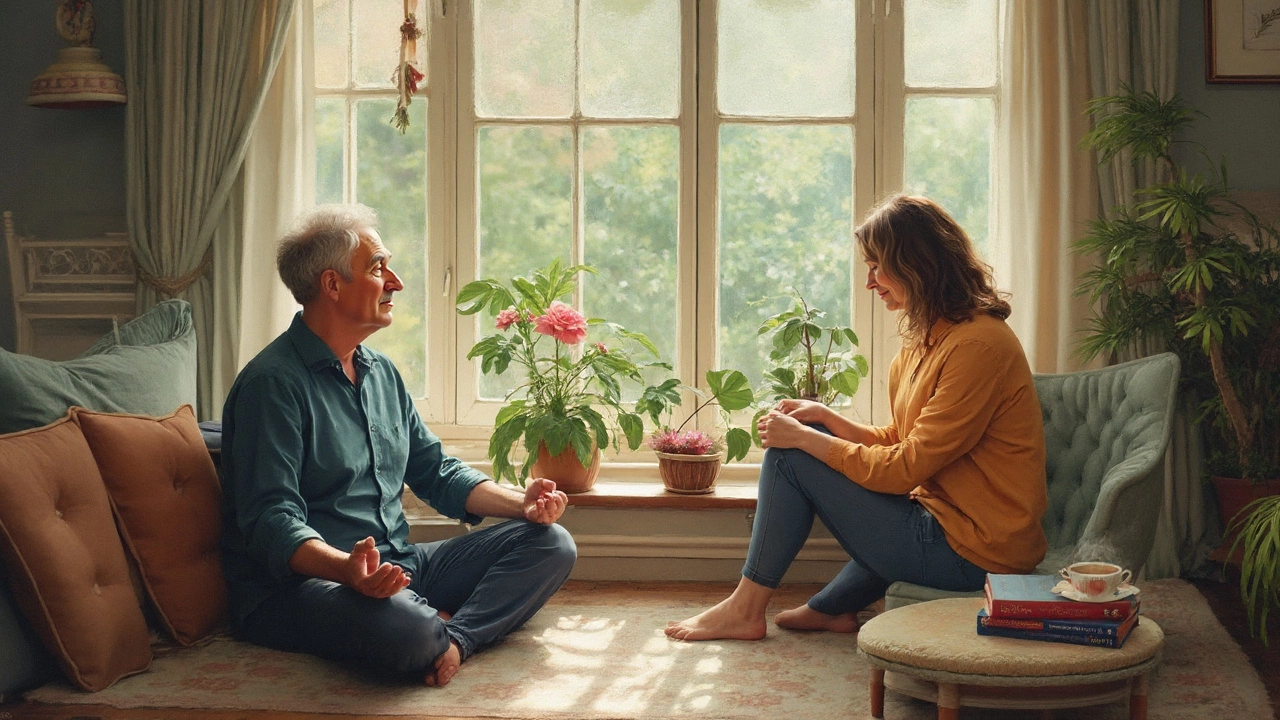Imagine blowing out a hundred candles on your birthday cake and actually enjoying the party. Longevity isn’t just about stretching out the years—it’s about adding joy, energy, and meaning to every extra day. The big question isn’t if we can live longer, but how we can do it with our minds and bodies still humming along. Research keeps revealing that people who reach exceptional ages aren’t superheroes. They tend to share very human habits—choices you can actually make, starting today.
The Power of Purpose and Connection
Most people focus on diets and gym memberships, but the truth is, meaning and relationships often set the foundation for a long, vibrant life. Studies from the Blue Zones—places where people often live past 100, like Okinawa (Japan) and Sardinia (Italy)—show that strong social ties and a sense of purpose are the glue holding everything together. In Okinawa, elders talk about their "ikigai"—their reason to get up in the morning. Purpose can be raising grandkids, nurturing a garden, or running marathons at 85. One large Harvard study tracked people for over 75 years and found relationships trumped wealth or fame when it came to predicting who’d stay healthy into old age. The happiest, longest-living folks kept in touch with friends, prioritised dinners with loved ones, and leaned into their communities. Those connections help buffer us from stress, boost our immune system, and even speed up recovery after illness.
If you’re not a natural social butterfly, start small. Make a habit of regular phone calls to friends, join a club, or volunteer locally. Consider the Australian bushcare groups—people join to plant trees or remove weeds and end up forming genuine friendships, which is just as good for your health as for the land. Loneliness, on the other hand, can be more damaging than smoking fifteen cigarettes a day, according to some medical journals. If the idea of ‘purpose’ feels overwhelming, remember it doesn’t have to be big or impressive. Even the small rituals—like checking on a neighbour or learning a new recipe—can give your days a sense of meaning.
Moving Is Non-Negotiable
You don’t need a marathon medal to earn a long life, but you do need to move. Physical activity is non-negotiable for those who want to rack up years with independence and vitality. Whether it’s walking, gardening, or dancing in the kitchen, steady movement keeps your heart, brain, and muscles strong. Data from an Australian study found that just 150 minutes of moderate exercise per week—think brisk walking or cycling—cuts the risk of early death by almost a third.
Let’s break this down with something practical: find a type of exercise you genuinely enjoy. Lifelong movement is far easier when you look forward to it. Some of the longest-living people in Ikaria, Greece, get their exercise from climbing hills, harvesting olives, and walking everywhere. They don’t stress about steps or reps—they just make moving a part of daily life.
| Activity | Minutes per Week | Expected Benefit |
|---|---|---|
| Walking briskly | 150 | 28% reduced risk of early death |
| Swimming | 120 | Lower risk of heart disease |
| Gardening | 90 | Mental health boost |
If your job ties you to a computer all day, try the "Pomodoro" method: work for 25 minutes, then get up and walk around for five. Or squeeze in ten-minute dance breaks—the best kind of mood lift, no matter what your age. And don’t ignore strength training; building muscle now protects you from falls and keeps metabolism humming well into your nineties. No gym required—bodyweight squats, carrying groceries, or climbing stairs do the trick.

The Longevity Diet: More Plants, Less Fuss
You’ve probably heard that what you eat plays a massive role in how long and well you live. The thing is, longevity diets aren’t about deprivation or exotic superfoods. They focus on real, mostly plant-based food. Blue Zones residents don’t cut out all meat or carbs, but plants are front and center on their plates. Think vegetables, beans, lentils, fruits, whole grains, nuts, and olive oil. In Ikaria, people eat a Mediterranean-type diet; in Okinawa, sweet potatoes, tofu, vegetables, and seaweed are staples. Here’s what happens when you pile your plate with plant goodness: lower inflammation, healthier guts, and better protection against heart disease and diabetes.
The science lines up, too. The EPIC-Oxford cohort study, based in the UK, followed more than 60,000 people and found vegetarians had a 32% lower risk of hospitalization or death from heart disease compared to meat-eaters. It’s not about being perfect, though. If you love a steak, enjoy it—just savor it less often, as a treat, not an everyday event. Most long-lived folks eat meat occasionally, but the heart of their meal is a rainbow of veggies and fiber-rich foods.
Some of the most practical shifts: swap white bread for whole grain, add a handful of beans to your salad, sprinkle seeds on breakfast, and try out a new veg or legume each week. Home cooking also matters—people who cook their own meals tend to live longer. Try prepping simple meals at home with olive oil, leafy greens, and a bit of fish or eggs. Drink enough water (aim for 6-8 cups a day), and go easy on the sugar. If you’re after an afternoon treat, dark chocolate and almonds hit a sweet spot without the rollercoaster sugar spike.
Better Sleep, Longer Life
We give sleep far less credit than it deserves, but every long-liver seems to be a master at getting good rest. Adults who get between seven and eight hours of sleep per night tend to live longer and have sharper brains, according to research from the University of California. Chronic sleep loss raises the risk of heart attack, diabetes, and even early death. It isn’t just about ‘enough’ sleep—it’s about quality, too. Deep, restorative sleep is what your body craves to repair itself and regulate hormones. In an analysis of more than 1.1 million people, those who consistently got the right amount of sleep enjoyed better health outcomes than their sleep-deprived counterparts.
Start building a sleep routine that signals your brain it’s time to wind down. Switch off screens an hour before bed—blue light from your phone or laptop messes with your natural sleep hormones. Try keeping your room cool, dark, and quiet. Some Blue Zone elders wind down by chatting with family over herbal tea or doing light stretching. If you struggle to fall asleep, meditation and mindfulness can help quiet a restless mind. Apps like Smiling Mind (made in Australia!) offer guided sessions for beginners.
Don’t ignore chronic snoring or restless nights; untreated sleep apnea and ongoing insomnia aren’t just annoying—they can shave years off your life. If you often wake up exhausted after a full night, talk with your doctor (or sleep clinic). Good sleep means better memory, stronger immunity, and more energy for the fun stuff—whether it’s catching a sunrise walk or playing with your grandkids. Sleep might just be the ultimate anti-aging tool hiding in plain sight.

Stress Less, Thrive More
We’re living in a world that rewards hustle, but stress is one party guest you don’t want to keep inviting back. Ongoing stress pumps out cortisol, a hormone that—if left unchecked—wreaks havoc on everything from immune function to how your cells age. Research from the University of California found that people who manage stress with healthy rituals have longer telomeres (those are tiny caps on DNA that break down with age), which means their cells stay youthful for longer.
What are these rituals? For some, it’s yoga or meditation. For others, it’s walking in the park, journaling, or listening to music. In Sardinia, men gather in the afternoons for gossip, laughter, and a glass of red wine—social stress relief in action. Australians have their own version, whether it’s an evening beach stroll or tea with a mate.
- Breathing techniques: Slow, deep breaths turn on your parasympathetic system, triggering calm in minutes.
- Being in nature: Studies show even a 20-minute walk in green space can lower stress hormones.
- Meaningful downtime: Hobbies that absorb your mind (gardening, music, woodworking) help your brain reset.
Take a fresh look at your daily schedule, and pencil in relaxation as seriously as any work meeting. Even small breaks make a difference. Studies by the Australian Psychological Society show that micro-breaks throughout the day lead to better mood, sharper focus, and fewer health complaints. If your life feels frantic, start by dropping one non-essential task and trade it for something restorative. Dealing with major stress? Bug a friend, make a support appointment, or practice self-compassion—every bit helps.
Sure, you can’t control everything life throws your way. But these five keys—purpose and connection, movement, a plant-focused diet, good sleep, and sensible stress relief—stack the odds firmly in your favour for a longer, brighter journey. Don’t try to tackle everything at once; pick one to start, and watch the ripple effect build. Who knows? That hundred-candle birthday might just be closer than you think.





